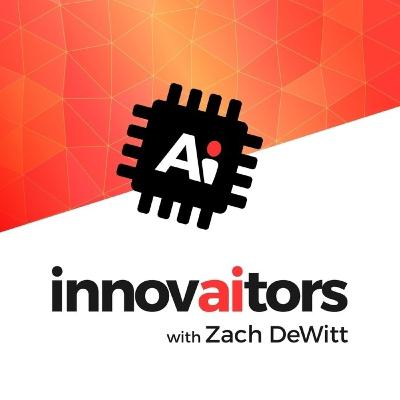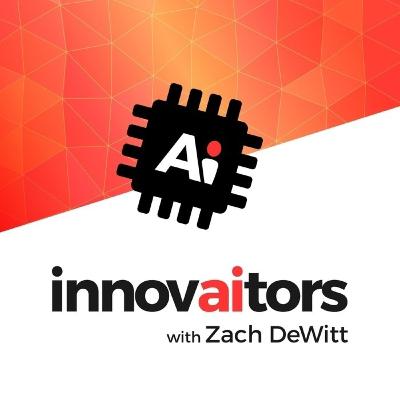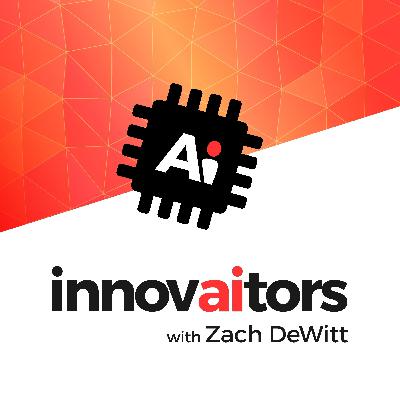Discover InnovAItors
InnovAItors

InnovAItors
Author: Zach DeWitt, Wing VC
Subscribed: 3Played: 37Subscribe
Share
© 2018 Innovaitors
Description
Join host Zach DeWitt as we highlight some of the most exciting and promising companies that are applying Artificial Intelligence (AI) to better serve their business customers. AI is a massive force that will reshape our business economy in profound ways. Hear firsthand from CEOs and developers on how they are using applied AI to build innovative and category-defining companies. Consumer-facing application that are powered by AI are well documented like ordering pizza from your Amazon Alexa or Netflix recommending you a new show, but in this series we will feature the next generation of B2B companies that are using AI in innovative ways. This podcast is produced by Wing Venture Capital (aka “Wing”), a Silicon Valley-based early stage venture capital firm. New episodes are released every three weeks. Visit www.wing.vc for more details. You can email me at zach@wing.vc or reach me on Twitter @zacharydewitt
14 Episodes
Reverse
Amazon’s continuous innovation has developed products integrated with machine learning and artificial intelligence, allowing these systems to be accessible to everyone. Bratin Saha, Amazon’s VP of Machine Learning, has helped to constantly advance the major brand’s AIML services along with work on their product strategies in order to better serve consumers.
##Amazon’s goal is to make machine learning available to all customers through their products
Amazon continues to make machine learning and AI accessible for its consumers in the products it launches. Because of Amazon, AIML is accessible at home, adopted by organizations for productivity and continuously advancing since its investments into tech.
##Amazon has been investing in AI for more than 20 years
The major brand invested in AI and machine learning more than 20 years ago. This move has allowed them to bring thousands of engineers and create products their consumers use daily including Alexa, Amazon Go and Prime.
##Machine learning and AI are being adopted across all spectrums of business
There isn’t an industry that hasn’t invested somewhat into AIML. With continuous innovations and growth, AIML will be consumed by everyone in any organization in the years to come.
Saha shares his thoughts on where machine learning and AI are headed with Amazon’s developments, why the brand’s services are the best in the business and more, on this week’s episode.
Key takeaways:
Amazon’s goal is to make machine learning accessible to all consumers with their products
AIML will become an aid to how people get insights as well as how to get more proactive recommendations to customers
Machine learning is having a very broad uptick as it is being adopted across all spectrums of business
Uber, the innovative rideshare company that has taken transportation to new levels of accessibility, is continuously developing ways to make the world move more efficiently through technology. Acknowledging the importance of artificial intelligence, Uber appointed Zoubin Ghahramani, the brand’s Chief Scientist and VP for AI, to steadily focus on how AI can advance people’s daily needs.
##A lot of start-ups and tech companies started getting interested in AI about 10 years ago
Ghahramani started his career in academia focusing on artificial intelligence. As he noticed AI’s impactful transition from academia to the tech industry, he began to advise start-ups and big tech companies into understanding AI’s industrial landscape. Within this transition, he started his company, Geometric Intelligence, that was acquired by Uber.
##Uber has a different strategy than other brands when it comes to AI
A lot of major companies invest in AI for the virtual world whereas Uber invests in the physical world. The decisions machine learning is helping with really matter to people including whether they’re going to get to one place to another on time, can they make income off of Uber’s platform and are trips safe.
##Academia focus and industry focus are different
A challenge Ghahramani faced once working with Uber was learning if his focus in academia would be useful in the tech industry. Once learning he had to change his ideas of how AI could be impactful, he was able to help develop cutting edge ideas and implement them to deliver high-value products.
Key takeaways:
To Uber, anything that goes from data to models and algorithms that makes predictions and optimized decisions counts in some way as a form of AI or machine learning
The use of AI for the physical world is continuously developing to help make people’s lives safer and more efficient while optimizing the world, creating income opportunities and more
Data and decision making go hand in hand in today’s economy, making it important to gather desired information quickly to make the right moves. Amit Prakash, co-founder and CTO of ThoughtSpot, knows the importance of obtaining analytics from his times at Microsoft and Google. Now, Prakash and his team are advancing how analytics are generated and how quickly they can be obtained. ThoughtSpot, a technology company that produces business-intelligence analytics search software, is on track to becoming the analytics engine of the world.
##A search and data-driven analytics engine
ThoughtSpot automates the interesting insights a business needs. Data is a big deal in this economy and ThoughtSpot’s system is making it more accessible at a faster rate with artificial intelligence and machine learning.
##ThoughtSpot has rethought what the architecture of a modern BI tool should be
Now, businesses are able to obtain data and make decisions much faster because of this system. Previously, systems took weeks to months to compile data whereas ThoughtSpot uses AI and machine learning to obtain data in minutes.
##ThoughtSpot has gotten really good at solving large problems at large enterprises
ThoughtSpot is being used in very meaningful ways at pretty much any large enterprise in any vertical. For example, one of the world’s largest retailers is using ThoughtSpot to optimize its decision cycles. Before, they would make decisions once a month making it harder to compete with Amazon where decisions were made much faster. After introducing ThoughtSpot, the retailer’s decision cycle went down from a month to less than an hour.
Listeners interested in learning more about ThoughtSpot can follow their progress on their site, ThoughtSpot.com.
Key takeaways:
As more and more companies enter the digital age, competition becomes fiercer and more cutthroat. Companies are required to adapt faster and faster to stay ahead, thus it is becoming imperative to be able to search across company databases for instantaneous answers to important questions.
ThoughtSpot is building a category-leading analytics and search platform for companies to ask questions in natural language and retrieve immediate answers. For example, with ThoughtSpot you can ask, “what are the quarterly sales by brand and by store?” without having to run complicated queries across multiple data sources.
There are many steps that go into building start-ups, with legal work being a huge component in the foundations of their success. As legal reaches more into the digital age, transparency with services and costs is needed, especially for these types of brands. Atrium, a tech-enabled law firm for high growth companies, is providing that need. Founded by serial entrepreneur Justin Kan, Atrium is in the hands of a CEO who has a history of successful start-ups.
##Atrium helps bring legal services into the modern age
Atrium not only offers lawyers that provide legal services and expert advising but also innovates around the start-up process. The company finds what can be automated, like sales, marketing or technology components, so the attorneys can focus on higher leverage tasks and advise clients.
##Kan chose to work with start-ups because of his history with them
Kan’s serial entrepreneurship has allowed him to accomplish some big wins and also learn from his losses. Prior to Atrium, he was the co-founder of Twitch, a live gaming platform Amazon acquired for $1B. Not only does his voice resonate with start-ups, but as these start-ups grow, his company can also grow with them.
##Customers receive a different experience with Atrium compared to big law firms
Atrium offers a different talent and client experience. They provide a transparent and predictable monthly subscription instead of project-based billing, so start-ups aren’t met with fluctuating prices each month. They also help automate and move as many tasks online as possible, leaving time for more important and creative jobs.
Listeners interested in learning more about Atrium can follow its Twitter page, @atrium. Listeners can also follow Kan on Twitter, @justinkan, where he shares many honest and personal insights into what it takes to be a serial entrepreneur.
Key takeaways:
Atrium is building a tech-enabled law firm that is initially serving start-ups but has even larger ambitions
One of the many ways Atrium is improving the legal experience is by switching to predictable monthly subscriptions as opposed to lumpy, project-based billing
Atrium already has hundreds of clients including the scooter company, Bird, our former InnovAItors podcast guest, Sift, and direct consumer contact lens business, Simple Contacts
Finding the best solutions for generating leads and building revenue online doesn’t have to be as challenging as it was in the past. With the help of conversational marketing, obtaining customer information and sealing deals is less of a challenge.
David Cancel, CEO of Drift, has helped many companies generate revenue through conversational marketing. With the help of AI, Drift can help generate more leads, collect desired information and create the entry point for sales. Cancel has a philosophy on company building and knows why AI is so important in Drift’s success. Inspired by the internal pains companies endure to find the best methods for lead generation and customer experience, Drift has recently been named to the Forbes Cloud 100 and the LinkedIn Top 50 Start-up list.
##Drift is the world’s leading conversational marketing and sales platform
Drift allows customers to instantly start chatting with a bot or a sales representative to get their questions answered quickly. The company serves up to 150,000 businesses and is the fastest-growing SaaS company.
##Drift is a trend-focused company
Cancel used a very different approach when starting Drift. The company focused more on the macro-changes it saw, behavioral changes and the momentum the world was already picking up on, and used those factors to resegment existing markets.
##Drift uses chat as an entry point for sales
Conversational marketing is how Drift shortens the path to revenue for their clients. With the help of AI, Drift’s software can chat with potential consumers, collect desired information and create more leads for their clients.
Listeners interested in following the process of Drift can visit their website, LinkedIn and Twitter pages.
Key takeaways:
The average website only converts 2% of its traffic. Drift is helping its customers generate more leads, convert more traffic and book more meetings
Drift is much more than a chatbot, in that it is a seamless platform to coordinate and manage all customer conversations
Cancel believes that AI will be in every application over the next decade. The goal is to never build an AI-powered company but to build the best product that serves customers needs
It can be a pain to constantly maneuver throughout different systems in order to find needed information, but UiPath is eliminating this laborious and manual issue with robotic process automation (RPA).
Param Kahlon, Chief Product Officer of UiPath, has helped many companies transform their processes quickly without having to rip and replace multiple applications they already have. With the help of RPA, robots work on behalf of humans so businesses and employees can focus on providing better customer experiences and lowering the amount of time committed to finding certain information.
Inspired by efficiency, UiPath has become the biggest growth category in the enterprise office space.
##UiPath’s technology can be applied to any industry
Generally, UiPath gets most of its traction from businesses in finance, customer service and human resources because of the high volume of repeatable processes that happen in their systems. However, UiPath’s tools can be used in any industry that needs automation applied to business processes.
##UiPath helps improve the customer experience
UiPath’s robots can shorten the amount of time needed for an employee to find customer information. For example, a robot can help banks consolidate all of their customers’ files across different systems so bankers can be better prepared for meetings. Robots can confirm an appointment with the customer hours ahead of time and then go into the bank’s systems and extract all the information about the customer the banker would need. This delivers a better customer as well as employee satisfaction experience by lowering the time needed to find this information manually.
##UiPath’s robots have certain skills to process information
UiPath’s robots can process applications and data on multiple platforms at once. Developed in four categories, the bots are able to collect and consolidate data by its ability to view, analyze, understand and predict information like a human using machine learning.
Listeners interested in UiPath’s products are able to sign up for a free version on their website or contact by email at community@uipath.com.
Key takeaways:
Robotic process automation, commonly referred to as RPA, is helping digitize and automate manual processes inside the enterprise saving money and time
UiPath is the market leader in RPA having grown to a $7B company in 14 years
There is a massive global opportunity ahead of UiPath as almost all enterprises have multiple processes which could be automated
Retailers, banks and airlines can see up to 90% of fraudulent logins attempting to steal some form of value in their systems. How are they protecting themselves against attacks?
Derek Smith, co-founder and CEO of Shape Security, has created a patent botwall service that protects many of the world’s largest banks, airlines, retailers and government agencies against cyberattacks, blocking more than a billion fraudulent login attempts daily.
During his time working on cybersecurity policies at the Pentagon, Smith discovered that fraudulent login attacks were a massive problem and would eventually hit corporate America. Smith’s vision with Shape Security is to develop core technology that sits in front of web and mobile technologies to help distinguish if logins are from consumers or computers, preventing fraudulent attacks.
##Shape Security doesn’t just prevent fraud but removes friction out of the consumer experience
Smith shares that he’s proud of the ability to increase their client’s revenue, not just decrease fraud. Shape takes the friction out of the consumer experience, making it easier for users to maneuver through web pages and even transactions without being disrupted by continuously re-entering passwords or other security measures. Smith’s goal is to see a day where there are no passwords and usernames needed because his system can guarantee that the person is who they say they are online.
##Attackers come from different parts of the world
It’s found that attackers who are searching for points of value or currency are usually from Russia or Eastern Europe, whereas attacks seeking information are usually from China and attackers trying to cause disruption usually come from the Middle East.
##Shape Security invests relentlessly on what attacks look like
Shape applies machine learning and artificial intelligence to stop attackers. As the company's software analyzes examples of the most sophisticated attacks, it learns how to identify and block new attack techniques, preventing breaches and online fraud.
Listeners interested in learning more about Shape Security and their progress may follow their blog for updates and new information.
Key takeaways:
Shape Security is helping more than 50% of the country’s largest airlines and banks as well as retail businesses like Starbucks by continuously - defending against fraudulent login attempts
Shape prevents over a billion fraudulent login attempts every day
Hackers continue to become more sophisticated, but Shape is using advanced machine learning techniques to counteract the ever-improving hacking methodologies
Is your job safe as automation advances?
HyperScience CEO Peter Brodsky shares his views on how machine learning and automation will affect data entry in the future. With software now able to eliminate the need for time-consuming, manual data entry, will these jobs become obsolete?
Brodsky also speaks on how AI will impact future software development, how jobs will be affected by automation, and entrepreneurial tips for anyone considering starting a startup.
##HyperScience is eliminating manual data entry
HyperScience uses machine learning and automation to read and enter data, allowing for faster input and removing costly, manual processes. More insurance, major world governments, and Global 3000 companies have begun using this tool to eliminate the need for manual data entry.
##The Future of software development
The way software is written will fundamentally be changed by artificial intelligence and machine learning. Within the next five years, there may be software that still doesn’t use AI, we ask how development will be affected.
##Jobs an automation
There’s a belief that automation will destroy jobs, but Brodsky disagrees. He says the right to a job doesn’t supersede thousands of people’s rights to good service, but never in history have we been able to make jobs go away.
We discuss how automation will remove the need for manual data entry, but should not affect people’s ability to find jobs.
Listeners who are interested in HyperScience, a company that removes the need for manual data entry by automating handwritten data, can follow their blog for announcements and more information.
Key takeaways:
The way future software will be written will mostly be impacted by machine learning and AI.
You don’t need to understand the “how” in machine learning, just the result you want to achieve.
Although automation will remove the need for manual data entry, it doesn’t mean job demand will decrease.
Can AI help global companies access and effectively manage the best talent around the world?
Listen as Jeremy Johnson, co-founder and CEO of Andela, chats with Zach about how Andela is solving the global technical talent shortage by building distributed engineering teams with Africa’s top software developers.
##Distributing Opportunity
The founding team of Andela was an incredible group of people coming together around the idea that brilliance is evenly distributed around the world, but opportunity is not.
One of the biggest challenges for Andela is helping people realize that race, gender, and nationality have nothing to do with aptitude and ability.
Often times in the US tech world, people think of Africa almost like a country and don’t realize that it’s actually 54 incredibly diverse countries and the youngest, fastest growing continent.
##Matching Talent Globally
Andela is a global company, specializing in engineering as a service. They help companies scale their product roadmap by providing talent and team management to effectively manage distributed, high quality, technical team members.
It is difficult for people to assess other people when it comes to talent and potential, and even the best hiring managers make mistakes.
Andela has collected thousands of data points on each individual engineer they work with and is able to layer that on top of what they know about their partner companies, including the tech stack and company culture. With the help of artificial intelligence, Andela makes it easier for companies to leverage the fact that there is talent all over the world using data to make automated decisions.
##The Trend of Distributed Teams
The notion of distributed work is not going away. We are moving toward a world where the idea that everyone has to come to work in an office will be forgotten. The question is not whether it will happen, but when.
Artificial intelligence will play a role in the move toward distributed teams over time by making it easier to quantify the output of team members.
Some of the biggest and most successful companies are starting to go distributed, giving them a key strategic advantage when it comes to having access to talent and hiring the best engineers.
Key takeaways:
Andela is helping solve a global technical talent shortage, as Jeremy says talent is evenly distributed, but opportunity is not;
Andela uses AI to efficiently match talented developers and engineers in Africa to global tech companies;
Remote and distributed work is a mega trend that Andela is well-positioned to capitalize on.
How many hours have you spent this week writing for your job? The average American worker spends upwards of 15 hours each week on email, and that’s just one kind of writing.
Textio is an augmented writing platform that wants everyone to feel empowered with the words that say what they really mean. CEO and co-founder Kieran Snyder, joins us to discuss the vision for Textio and how it works.
Listen to learn how Textio makes is easier for businesses to attract the right candidates through the best job descriptions that represent their culture and how it provides valuable insight into how the brand sounds already relative to competitors in the industry.
##The Importance of Words in Business
No matter the industry, the thing we’re actually making the most of every day is words, and it’s an expensive problem for companies when those words are wrong, whether it’s in recruiting, selling a product, or writing to one another internally.
Textio is an augmented writing platform that uses natural language processing to help companies attract better talent by unlocking the best language to engage potential candidates.
There is a gap between how we sound and how we mean to sound, and Textio’s purpose is to help every single writer bridge that gap and give them the words they need to attract the people they want to hire using language that reflects the very best of their values and culture.
##Changing How People Collaborate
AI-enabled software is about more than just enabling machines and people to work together. With Textio, it’s about enabling writers to collaborate with each other.
When you’re writing on your own, you’re limited by your own ability to predict what’s going to work, but Textio helps writers connect with all of the other writers in the community through shared data with attached outcomes.
Textio sees that the big opportunity is in helping people collaborate more effectively together and learn from one another’s experiences.
##How it Works
It’s one thing to know that a document will perform poorly, but what’s really valuable is to know how to make it better. For Textio to work it needs to crack open those models in a way that is explainable to any person that is writing for the platform.
You don’t need to be a linguist or data scientist to use Textio. Through the use of an intuitive 0-100 “Textio Score,” they make it accessible, approachable, and clear to writers what changes they need to make to get that score higher.
When using the Textio flow, you just drop a few notes onto your writing canvas and Textio proactively shapes it with you into the language that works, taking just two or three words and elaborating it into a complete concept that’s exactly what you mean.
Key takeaways:
Textio is an augmented writing platform that makes it easy for the user to write best in class job descriptions;
Textio has a differentiated go-to-market advantage, in that they can come to the first meeting showing you stats and insights on how your job descriptions compare to those of your competitors and what you need to do to attract better talent;
Textio is solving a real business problem, and the team has done a nice job with the product in terms of making it easy for the user to increase their - Textio score, which equates to attracting more qualified candidates and reducing time to hire.
What is revenue intelligence and how does it solve real business problems?
Today we have a special episode as Wing Venture Capital founding partner Peter Wagner and your host Zach sit down for a candid conversation with Amit Bendov, the CEO and co-founder of Gong.
Listen to learn how Gong uses artificial intelligence to unlock revenue data and provide valuable insights for sales reps and managers to improve sales.
##What is Gong?
Gong unlocks a unique data set by monitoring and ingesting call and email data and providing reps and managers with increased deal visibility from contact to close and valuable insights to improve sales.
Gong has over 500 customers using the product today. Their customers range from small companies like start ups with small teams trying to figure out their initial product market fit to customers like GE and LinkedIn who have thousands of sales reps.
##Gong provides insights
One of the powers of Gong is that it gets rid of opinions, leaving you just with what the data shows.
There are multiple levels of insights customers can receive from Gong. At the most basic level, it tracks activity volume, such as how many calls and emails a rep has each day. The second is interaction skills such as patience, asking questions, and allowing the customer to talk.
Finally, for larger companies, over time Gong monitors conversations and outcomes in the CRM, and given enough data it will start providing insights on the winning patterns.
##Three pillars of Gong
“I started Gong because I realized how little information we were getting from our CRM system,” says Amit Bendov, CEO and co-founder of Gong.
CRMs tell us who our customers are, how many deals we’re winning, and what our contract value is with each customer, but there are some fundamental questions that don’t get answered.
Gong wants to answer three of these questions: Why are some sales reps successful when others are not? Why are we losing some deals and winning other deals? What’s really happening in the market?
The three pillars of Gong, or the three applications are: people success, deal success, and strategy success.
People success is about improving how we operate. Deal success is about improving the win rate by understanding how opportunities behave in the market. And strategy success is about high-level product insights for senior management.
Key takeaways:
Gong is unlocking a unique data set and empowering sales reps and managers by providing them with more visibility into the deal process and making recommendations for improving their conversations;
Gong has invested heavily in its artificial intelligence, including its natural language processing and machine learning algorithms, but the company’s success can be attributed to Gong’s laser focus on solving a real business problem;
AI is helping Gong both improve its go to market strategy and providing unique insights and recommendations to its customers to help them win more deals.
What are the challenges that prevent us from having safe autonomous vehicles on the road today?
Today we are joined by DeepMap co-founder and CEO James Wu to talk about how the company wants to tackle these challenges and accelerate the progress and availability of safe autonomy by providing the world's best HD mapping and localization services.
##The Challenges of Safe Autonomy
DeepMap is building a software solution for HD mapping and localization for autonomous vehicles, but there are a few major challenges to overcome.
First, there's the technology challenge, which is a very difficult problem to solve. Another big issue is the economic challenge. How can we make a self driving car that's actually more affordable than a human driven car?
##DeepMap’s Mission
DeepMap co-founder and CEO James Wu realized that all the major players in the space will be facing the same challenges.
"It doesn't make sense to reinvent the wheel over and over as an industry," says Wu. If everyone is building their own self driving car and developing their own HD map, valuable time and resources are wasted.
The ultimate goal is to make self driving car technology a commodity sooner by partnering with companies working in the self driving space. DeepMap is building a powerful HD map engine which enables their customers to do mapping and localization quickly, reliably, and affordably.
##The Future of Self Driving Vehicles
So the big question is, how far away are we from having autonomous vehicles? James Wu says while the technology itself is progressing, there is still work to be done in other areas. For example, cooperation and new regulations will be needed from many different agencies and companies, according to Wu.
Key takeaways:
DeepMap's mission is to accelerate safe autonomy by providing the world's best HD mapping and localization services;
DeepMap is using cutting edge machine learning technology
DeepMap is laser focused on solving a real business problem and helping their customers map the physical world at an affordable cost;
James Wu, a leading expert in mapping technology, believes we are approaching a time when human drivers will share the road with autonomous vehicles, but this will require further coordination from companies, policy makers, and government agencies.
Sift uses machine learning to help businesses build out their trust and safety efforts by preventing fraud before it happens and providing frictionless and delightful experiences to trustworthy customers.
Listen to learn how Sift protects clients like Airbnb, Yelp, and Twitter from bad actors, fake accounts, spammy content, and more using AI, machine learning, and a customer-first approach.
##What is Sift?
In 2011 when Sift was founded, they were essentially a solution in search of a problem, says CEO and co-founder Jason Tan. This was still the early days of machine learning. They knew that ML was going to disrupt many different industries, but they wanted to find a problem domain where the value proposition would really stick.
One of the exercises they did was ask their friends in the tech community about the challenges their businesses were dealing with, and the issue of fraud emerged as a big problem with which people wanted help.
The fact that they were outsiders in the fraud space helped them approach this domain with first principles and a more modern perspective on how to solve this problem effectively. That is how Sift was born.
##Trust and Safety on the Internet
Legacy approaches to security on the internet operate much like airport security, not really thinking about user experience, according to Jason. What it really needs is more of a TSA pre-check type model, which allows a frictionless experience to trustworthy customers who are not risky.
“For us, we see the opportunity as much bigger than fraud,” he says. “We use the words trust and safety very intentionally...it’s really that conjunction ‘and.’ It’s not trust or safety, it’s trust and safety.”
When you’re optimizing for both of these variables, it’s really about looking at the big picture. Sift is concerned with removing both friction and risk from every interaction with the end user.
##Potential and Adoption
If you look at Sift’s client list, it’s interesting to see the adoption of their technology platform across a diverse set of customers. One of the big opportunities for their services is in the ecommerce world.
Currently, e-commerce accounts for less than 15% of retail sales in the U.S., and it’s continuing to grow rapidly. There is definitely the potential for that equation to be flipped on its head, and the bad actors in the fraud industry will follow.
But there are many other applications for this technology. Sift also solves for account takeovers, fake accounts, and spammy content.
Facebook has recently reported that over the last 10 years they took down over 216 million fake accounts. YouTube had to hire a few thousand people to moderate content. Smaller companies likely won’t have the resources to spend on these problems, and that’s the big opportunity they see.
Key takeaways:
Digital fraud is a massive and growing category with increasingly sophisticated actors;
Sift is a category leading provider of digital trust and safety;
Sift relies on both ingesting large amounts of customer data and applying machine learning to these data sets to improve its fraud models and - ultimately protect its customers.
Join host Zach DeWitt as we highlight some of the most exciting and promising companies that are applying Artificial Intelligence (AI) to better serve their business customers. AI is a massive force that will reshape our business economy in profound ways. Hear firsthand from CEOs and developers on how they are using applied AI to build innovative and category-defining companies. Consumer-facing application that are powered by AI are well documented like ordering pizza from your Amazon Alexa or Netflix recommending you a new show, but in this series we will feature the next generation of B2B companies that are using AI in innovative ways. This podcast is produced by Wing Venture Capital (aka “Wing”), a Silicon Valley-based early stage venture capital firm. New episodes are released every three weeks. Visit www.wing.vc for more details. You can email Zach at zach@wing.vc or reach him on Twitter @zacharydewitt
More information at http://wing.vc/podcast


















